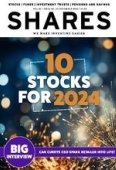Archived article
Please note that tax, investment, pension and ISA rules can change and the information and any views contained in this article may now be inaccurate.
Active managers struggle to keep pace with trackers again

It’s been another poor year for active managers across the seven key equity sectors monitored by AJ Bell’s Manager versus Machine report. Overall, just 36% of active managers outperformed the average passive alternative in 2023.
One year is too short a time frame over which to judge the success of active management, but things don’t look better if you zoom out a bit either. Over 10 years, just 32% of active managers have beaten the passive machines.
It’s little wonder that many investors are plumping for trackers over active strategies. Over the last five years £9 billion has been withdrawn from active funds by UK retail investors, and that compares to £75 billion going into passive funds, based on Investment Association data.
There are some mitigating factors which may help to spare some of the blushes of active managers. Much of the weak overall showing comes down to the performance of active funds in the popular global sector.
Here only a quarter of active funds have managed to beat a passive alternative over the last 10 years. This is in part due to the fact that the winning stocks in the global market have generally been a clutch of large technology companies.
HARD TO KEEP UP
While active managers are of course free to invest in these stocks, and many have, actually investing more than a passive fund means taking a pretty big bet. For example, a typical global tracker fund currently holds around 5% in each of Apple (AAPL:NASDAQ) and Microsoft (MSFT:NASDAQ).
That’s more than in the whole UK stock market, which currently makes up just over 4% of the MSCI World Index. Active managers may baulk at holding more than this in just one stock within a globally diversified portfolio.
Amongst UK equity funds, another crucial market, there have also been some structural trends which have dented the performance of active managers. Mid and small caps have underperformed their large cap cousins in the last two years, which has been to the detriment of active managers, who tend to hunt down the cap scale for more covert investment opportunities.
Over the longer term mid and small cap exposure has been a tailwind for active managers plying their trade in UK shares, but the current climate is favouring the blue chips, for now.
It’s easy to decry the skill of active managers when it transpires that under a third have beaten a passive alternative over 10 years, but we do have to take into account the market context too, as it may simply be that active managers are just on a bad run. It’s also important to set appropriate expectations when looking at a wide universe of active managers.
The reality is that while all active fund investors expect outperformance, it’s not statistically possible for all managers to outperform. Investors therefore need to pick their battles wisely, by acknowledging that some markets have proved more difficult to beat than others, and by selecting active fund managers in whom they have a high degree of conviction.
A long and successful track record suggests outperformance has been achieved by skill and not just luck, but it’s still no guarantee for the future, so any active portfolio should include several managers for diversification.
Even if you favour a passive approach, there are some areas of the market which are not well served by passive vehicles, or which generally favour an active hand on the tiller, such as producing income, preserving capital or investing in small caps.
Investors can of course blend both active and passive strategies as they see fit, rather than choosing just one approach for their whole portfolio. While at an aggregate level, there are questions over the benefits of active management, there are some active managers who have undoubtedly added value over a long time frame.
By engaging in some judicious fund selection, investors in active funds also help to tilt the odds in their favour.
DISCLAIMER: AJ Bell owns Shares magazine. The editor (Tom Sieber) and author (Laith Khalaf) of this article own shares in AJ Bell.
Important information:
These articles are provided by Shares magazine which is published by AJ Bell Media, a part of AJ Bell. Shares is not written by AJ Bell.
Shares is provided for your general information and use and is not a personal recommendation to invest. It is not intended to be relied upon by you in making or not making any investment decisions. The investments referred to in these articles will not be suitable for all investors. If in doubt please seek appropriate independent financial advice.
Investors acting on the information in these articles do so at their own risk and AJ Bell Media and its staff do not accept liability for losses suffered by investors as a result of their investment decisions.
Issue contents
Case study
Feature
- Return from our 2023 share picks is more than four times that of the UK market
- The best and worst emerging markets in 2023
- Can electricals leader Currys deliver some turnaround spark?
- Discover the stocks the professionals changed their minds on in 2023
- Emerging markets: China property fixes and dollar weakness
Great Ideas
- 10 stocks for 2024: our best ideas for the year ahead
- Stock pick for 2024: Adobe is one of the best ways to play AI
- Stock pick for 2024: Buy Smith & Nephew for continued recovery and re-rating potential
- Stock pick for 2024: Buy Puretech Health for lower risk access to an exciting drug portfolio
- Stock pick for 2024: MongoDB is one of the hottest software plays on AI
- Stock pick for 2024: B&M's growth ambitions and value focus make it a compelling story
- Stock pick for 2024: Hunting is attractively priced and evidence of transformation is a clear catalyst
- Stock pick for 2024: The market has not spotted RELX for the AI winner it is
- Stock pick for 2024: Just Group is so cheap and has big growth drivers behind it
- Stock pick for 2024: Hollywood Bowl is a strikingly resilient operator trading at the wrong price
- Stock pick for 2024: Take advantage of this 'generational opportunity' to buy Conduit
Investment Trusts
News
- How TSMC could set the New Year tone for tech
- Markets higher despite mixed rates messaging and what to expect from retailers
- Discover the most unloved and most-shorted UK stocks
- Costco climbs to all-time high as members clamour for cheap essentials
- A big acquisition and a slowdown in its largest market have unnerved investors in Rentokil
- UK housebuilders Taylor Wimpey and Persimmon have moved-up strongly

 magazine
magazine








